Accelerate > Publications
Search this online library featuring the latest FAO publications, issue papers and briefs which offer up-to-date knowledge and innovative insights for SDG acceleration.
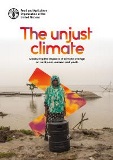
The unjust climate: Measuring the impacts of climate change on rural poor, women and youth
2024
This report assembles an impressive set of data from 24 low- and middle-income countries in five world regions to measure the effects of climate change on rural women, youths and people living in poverty. It analyses socioeconomic data collected from 109 341 rural households (representing over 950 million rural people) in these 24 countries. These data are combined in both space and time with 70 years of georeferenced data on daily precipitation and temperatures.
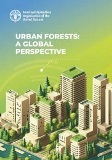
Urban forests: a global perspective
2023
Urban forestry is not a one-size-fits-all solution; each city and region, with its own unique set of challenges and opportunities, requires tailored strategies. In recognition of the diversity and distinctiveness of urban forestry issues and their potential for mitigating environmental and socioeconomic inequality across the globe, FAO has asked experts around the world to share their views on how urban forests and trees are perceived and managed in their respective geographical areas,...
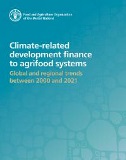
Climate-related development finance to agrifood systems: Global and regional trends between 2000 and 2021
2023
This publication addresses the persistent knowledge gap related to climate finance to agrifood systems, providing data and information to support countries making informed decisions towards agrifood systems transformation. The analysis brings to light the evolution of climate finance in agrifood systems over the past two decades, showcasing unique sectorial analysis of climate finance allocations for adaptation and mitigation, delving into the diversity of actors involved...
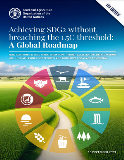
Achieving SDG2 without breaching the 1.5C threshold: A Global Roadmap
2023
Accelerated climate actions can transform agrifood systems and help achieve food security and nutrition both today and tomorrow.
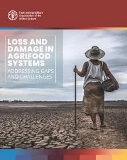
Loss and damage and agrifood systems - Addressing gaps and challenges
2023
The purpose of this report is to stimulate discussions on the central role of agrifood systems in the loss and damage debate and identify the gaps in data, knowledge and finance that need to be addressed. The report provides an overview of the loss and damage concept, the status of analytical methodologies and tools, a summary of the reporting on loss and damage in nationally determined contributions (NDCs), an outline of the policy needs and some preliminary analysis of the financing needs.
.tmb-th600x450.jpg?Culture=en&sfvrsn=f848bd69_11)
FAO Action Plan 2022–2025 for the implementation of the FAO Strategy on Climate Change
2023
The elements of the Action Plan are derived from the Theory of Change anchored in the Strategy. The Action Plan is therefore articulated around the three pillars and six outcomes of the Strategy. In addition, and with the aim to provide more clarity, action areas have been introduced to cluster the outputs, which are concrete results contributing to each outcome of the Strategy.
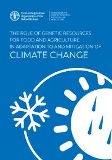
The role of genetic resources for food and agriculture in adaptation to and mitigation of climate change
2022
The main focus of this study is the state of current use of genetic resources in climate change adaptation and mitigation efforts. Each chapter explores the impacts of climate change on genetic resources and also considers the significance of genetic resources to climate change adaptation and mitigation.
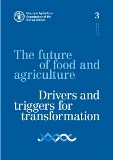
The future of food and agriculture – Drivers and triggers for transformation
2022
This report aims at inspiring strategic thinking and actions to transform agrifood systems towards a sustainable, resilient and inclusive future, by building on both previous reports in the same series as well as on a comprehensive corporate strategic foresight exercise that also nurtured FAO Strategic Framework 2022–31. It analyses major drivers of agrifood systems and explores how their trends could determine alternative futures of agrifood, socioeconomic and environmental systems.
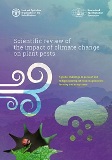
Scientific review of the impact of climate change on plant pests - A global challenge to prevent and mitigate plant-pest risks in agriculture, forestry and ecosystems
2022
Climate change represents an unprecedented challenge to the world’s biosphere and to the global community. It also represents a unique challenge for plant health. Human activities and increased market globalization, coupled with rising temperatures, has led to a situation that is favourable to pest movement and establishment. This scientific review assesses the potential effects of climate change on plant pests and consequently on plant health.

Indigenous Peoples’ food systems: Insights on sustainability and resilience from the front line of climate change
2022
This publication provides an overview of the common and unique sustainability elements of Indigenous Peoples' food systems, in terms of natural resource management, access to the market, diet diversity, indigenous peoples’ governance systems, and links to traditional knowledge and indigenous languages. While enhancing the learning on Indigenous Peoples food systems,...
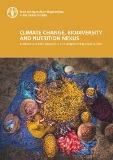
Climate change, biodiversity and nutrition nexus
2021
This paper identifies entry points within agri-food systems to improve biodiversity and diets, two levers that can be used to enhance nutrition and optimize environmental sustainability while ensuring social equity, especially of the most vulnerable people. It also presents recommendations for concrete actions by key stakeholders – governments, academia, civil society, private sector, and development partners –to build resilient, inclusive, and sustainable agri-food systems. KEYWORDS:

Renewable energy for agri-food systems: Towards the Sustainable Development Goals and the Paris Agreement
2021
While energy has a key enabling role in food system transformation and innovation in agriculture, its current use is unsustainable because of the high dependence on fossil fuels and frequent access to energy in developing countries. The challenge is to disconnect fossil fuel use from food system transformation without hampering food security. In this context, IRENA and FAO jointly developed this report on the role of renewable energy used in food chain to advance energy and food security...

Addressing the climate change and poverty nexus - A coordinated approach in the context of the 2030 Agenda and the Paris Agreement
2019
Climate change threatens our ability to ensure global food security, eradicate poverty and achieve sustainable development. About 736 million people live in extreme poverty, and the global response to climate change today will determine how we feed future generations.
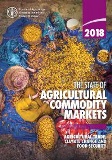
The State of Agricultural Commodity Markets 2018 - Agricultural trade, climate change and food security
2018
This edition of The State of Agricultural Commodity Markets focuses on the complex and underexplored intersection between agricultural trade, climate change and food security. The report makes an important contribution to the policy debates on climate change adaptation and mitigation under the Paris Agreement and the multilateral agricultural trade rules.
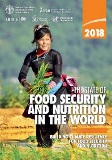
The State of Food Security and Nutrition in the World 2018 - Building climate resilience for food security and nutrition
2018
New evidence this year corroborates the rise in world hunger observed in this report last year, sending a warning that more action is needed if we aspire to end world hunger and malnutrition in all its forms by 2030. Updated estimates show the number of people who suffer from hunger has been growing over the past three years, returning to prevailing levels from almost a decade ago..
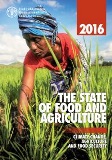
The State of Food and Agriculture 2016 - Climate change, agriculture and food security
2016
The 2016 SOFA report presents evidence on today and tomorrow’s impact of climate change on agriculture and food systems. The report assesses the options to make agriculture and food systems resilient to climate change impacts, while minimizing environmental impacts. It shows that making agriculture and food systems sustainable is both economically and technically feasible.
Browse by SDG
- SDG1: No Poverty
- SDG2: Zero Hunger
- SDG3: Good Health & Well-being
- SDG4: Quality Education
- SDG5: Gender Equality
- SDG6: Clean Water & Sanitation
- SDG7: Affordable and Clean Energy
- SDG8: Decent Work and Economic Growth
- SDG9: Industry, Innovation and Infrastructure
- SDG10: Reduced Inequalities
- SDG11: Sustainable Cities and Communities
- SDG12: Responsible Consumption and Production
- SDG13: Climate Action
- SDG14: Life Below Water
- SDG15: Life on Land
- SDG16: Peace, Justice and Strong Institutions
- SDG17: Partnerships for the Goals
Browse by Better
Browse by Priority Area
- Innovation for Sustainable Agriculture Production
- Blue Transformation
- One Health
- Small-Scale Producers' Equitable Access to Resources
- Digital Agriculture
- Healthy Diets for All
- Nutrition for the Most Vulnerable
- Safe Food for Everyone
- Reducing Food Loss and Waste
- Transparent Markets and Trade
- Climate Change Mitigating and Adapted Agrifood Systems
- Bioeconomy for Sustainable Food and Agriculture
- Biodiversity and Ecosystem Services for Food and Agriculture
- Achieving Sustainable Urban Food Systems
- Gender Equality and Rural Women's Empowerment
- Inclusive Rural Transformation
- Agriculture and Food Emergencies
- Resilient Agrifood Systems
- Hand-in-Hand Initiative
- Scaling up Investment
